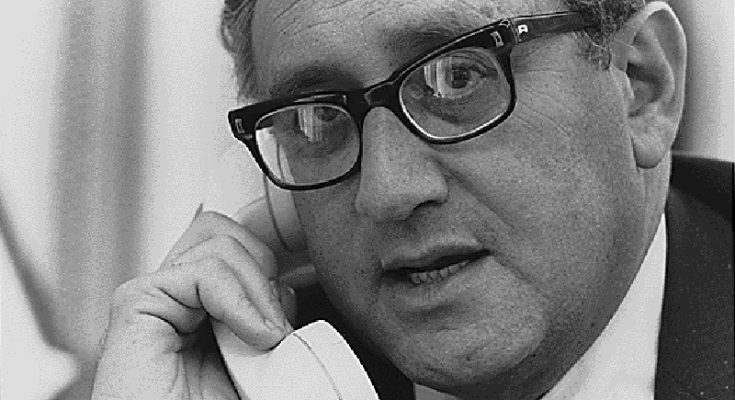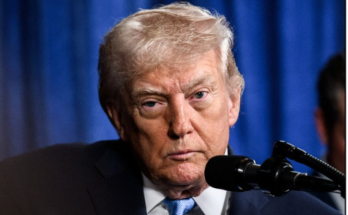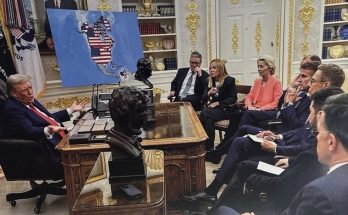By Sujoy Dhar
#USDiplomat, #HenryKissinger, #Geopolitics, #ColdWar
IBNS-CMEDIA: Henry Kissinger, the former US Secretary of State and a master of realpolitik known for his crucial yet polarising role in American foreign policy during the period of the Cold War, has died at the age of 100.
He is survived by his wife, Nancy, two children from his first marriage, Elizabeth and David, and five grandchildren, according to CNN.
The American diplomat, politician and geopolitical consultant who also served as the country’s national security advisor under the US presidents like Richard Nixon and Gerald Ford and had won a Nobel Prize controversially, died on Wednesday at his residence in Connecticut, according to a statement from his geopolitical consulting firm, Kissinger Associates.
The cause of his death was not shared by the firm.
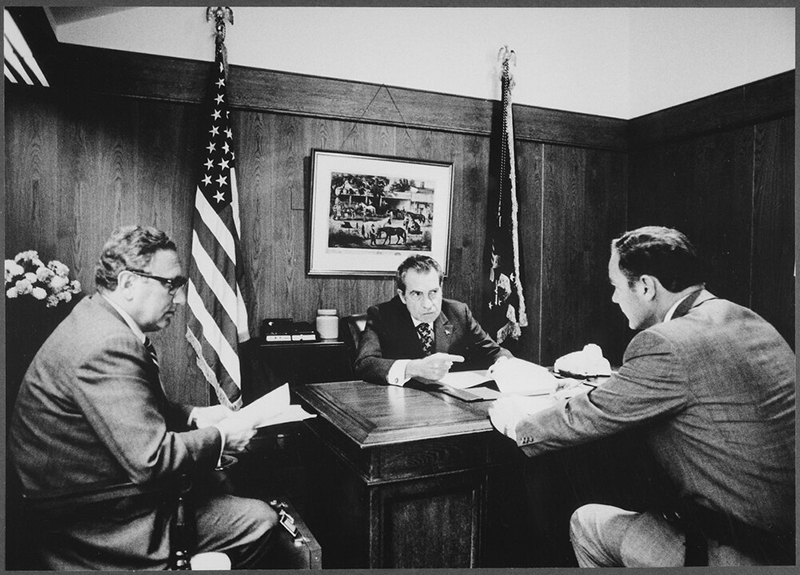 Kissinger and President Richard Nixon discussing the Vietnam situation in Camp David, 1972 (with Alexander Haig). Photo courtesy: Wikipedia/Creative Commons
Kissinger and President Richard Nixon discussing the Vietnam situation in Camp David, 1972 (with Alexander Haig). Photo courtesy: Wikipedia/Creative Commons
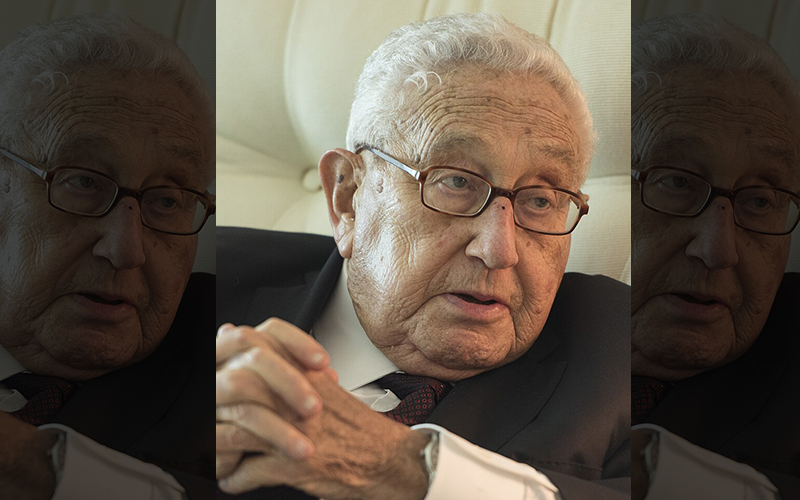 The man who was both celebrated and flayed as a “war criminal” would be interred at a private family service, to be followed at a later date by a public memorial service in New York City, it added.
The man who was both celebrated and flayed as a “war criminal” would be interred at a private family service, to be followed at a later date by a public memorial service in New York City, it added.
Kissinger was a German-born Jewish refugee who fled Nazi Germany with his family in 1938 and later went to Harvard College in 1950, where he studied under William Yandell Elliott. He earned his Master of Arts and Doctor of Philosophy at Harvard University in 1951 and 1954, respectively.
Kissinger was the architect of the United States foreign policy between 1969 and 1977, pioneering the policy of détente with the Soviet Union. He was the man behind starting an opening of relations with communist China. He engaged in what is known as shuttle diplomacy in the Middle East leading to four Arab-Israeli agreements, and negotiating the Paris Peace Accords, which ended American involvement in the Vietnam War.
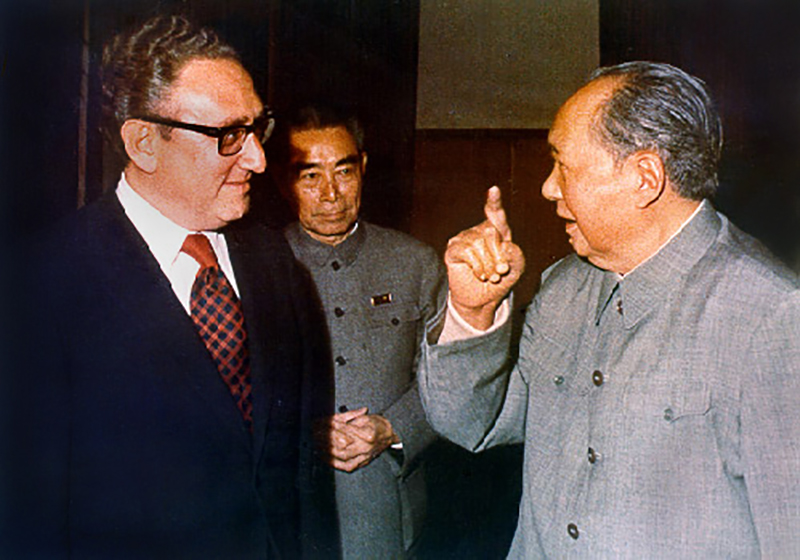 Kissinger, shown here with Zhou Enlai and Mao Zedong, negotiated rapprochement with China. Photo courtesy: Wikipedia/Creative Commons
Kissinger, shown here with Zhou Enlai and Mao Zedong, negotiated rapprochement with China. Photo courtesy: Wikipedia/Creative Commons
After leaving government, he formed Kissinger Associates, an international geopolitical consulting firm. Kissinger wrote over a dozen books on diplomatic history and international relations.
While his Cold War containment strategy was hailed, he was also hated by the liberals.
The Foreign Policy writes on his obituary: “Yet Kissinger also came to be reviled, especially by liberals, for practicing what they regard as a cold-blooded projection of American power that contributed to countless deaths. At Nixon’s side, he supported the disastrous bombing of Cambodia that led to the rise of the Khmer Rouge and its monstrous slaughter of more than a million people. Following the U.S. invasion of Cambodia, Kissinger completed peace talks with Vietnam that won him a Nobel Peace Prize but ultimately led to the humiliating North Vietnamese takeover just two years later in America’s worst defeat in a war until that point.”
According to American think tank Council on Foreign Relations, Dr. Kissinger will be remembered as one of the most influential foreign policy scholar-practitioners in U.S. history. “His illustrious diplomatic career and unrivaled capacity to think strategically and analytically about the world order will continue to inspire future generations of foreign policy professionals,” the CFR said.
He was awarded the Nobel Peace Prize in 1973 for ending American involvement in the Vietnam War but the decision to award him by the fractured Nobel committee remained the most controversial ever. Two members of the Nobel committee stepped down over the conferment of the prize to him holding him responsible for the secret U.S. bombing of Cambodia.
US President Gerald Ford used to call Kissinger a “super secretary of state” while many call him a war criminal and law breaker who should be prosecuted under international laws for “ordering and sanctioning the destruction of civilian populations, the assassination of inconvenient politicians, the kidnapping and disappearance of soldiers and journalists and clerics who got in his way.”
In his 2001 book “The Trial of Henry Kissinger” Christopher Hitchens wrote: “The burden therefore rests with the American legal community and with the American human-rights lobbies and non-governmental organizations. They can either persist in averting their gaze from the egregious impunity enjoyed by a notorious war criminal and lawbreaker, or they can become seized by the exalted standards to which they continually hold everyone else. The current state of suspended animation, however, cannot last. If the courts and lawyers of this country will not do their duty, we shall watch as the victims and survivors of this man pursue justice and vindication in their own dignified and painstaking way, and at their own expense, and we shall be put to shame.”
Reviewing Christopher Hitchens’s book, Human Rights Watch wrote that though admittedly dripping with venom towards Kissinger, and at times rambling and unfocused, it persuasively marshals the long-known, as well as the recently declassified, evidence to demonstrate Kissinger’s role in the destruction of Chilean democracy and the consolidation of the Pinochet dictatorship, the prolongation of the Vietnam War through the sabotage of Lyndon Johnson’s 1968 Vietnam peace talks, the Indonesian invasion and subsequent rape of East Timor, the Greek military junta’s invasion of Cyprus in 1974, civilian deaths from United States’ aerial bombing in Laos and Cambodia and the Pakistani army’s crimes against humanity in East Pakistan (now Bangladesh).
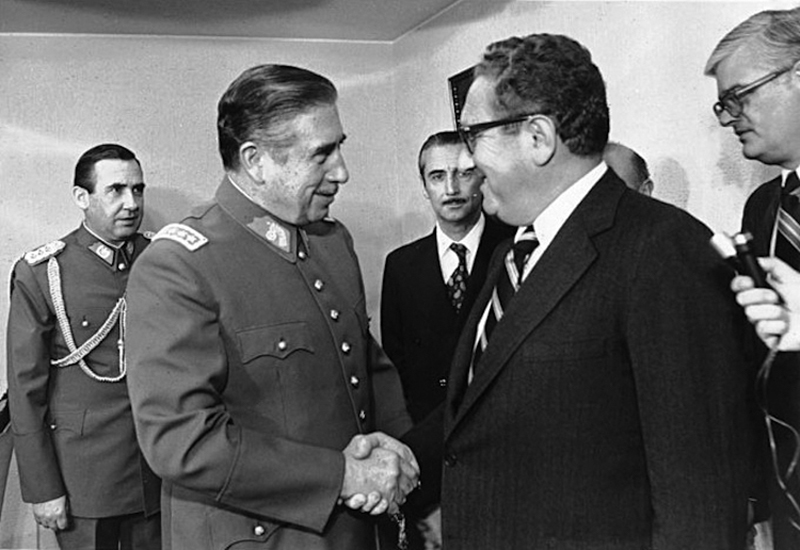 Chilean President Augusto Pinochet shaking hands with Kissinger in 1976. Photo courtesy: Wikipedia/Creative Commons
Chilean President Augusto Pinochet shaking hands with Kissinger in 1976. Photo courtesy: Wikipedia/Creative Commons
“Quite an impressive record for one man, even a Nobel Peace Prize Laureate,” it wrote.
His support of Pakistani dictator during Bangladesh Liberation War
Nixon backed Pakistani dictator, General Yahya Khan, in the Bangladesh Liberation War in 1971.
Kissinger had not much compassion for the dying Bengalis and ignored the first telegram from the United States consul general in East Pakistan, Archer K. Blood, and 20 members of his staff, which informed the US that their allies West Pakistan were undertaking, in Blood’s words, “a selective genocide” targeting the Bengali intelligentsia, supporters of independence for East Pakistan, and the Hindu minority.
When Kissinger called Indians “bastards” and Indira Gandhi a “bitch”
As the Pakistan army was genociding the Bangladeshis, Henry Kissinger on June 3, 1971 after the controversial meeting of then Prime Minister Indira Gandhi and President Nixon called the Indian PM a “bitch” and Indians “bastards”.
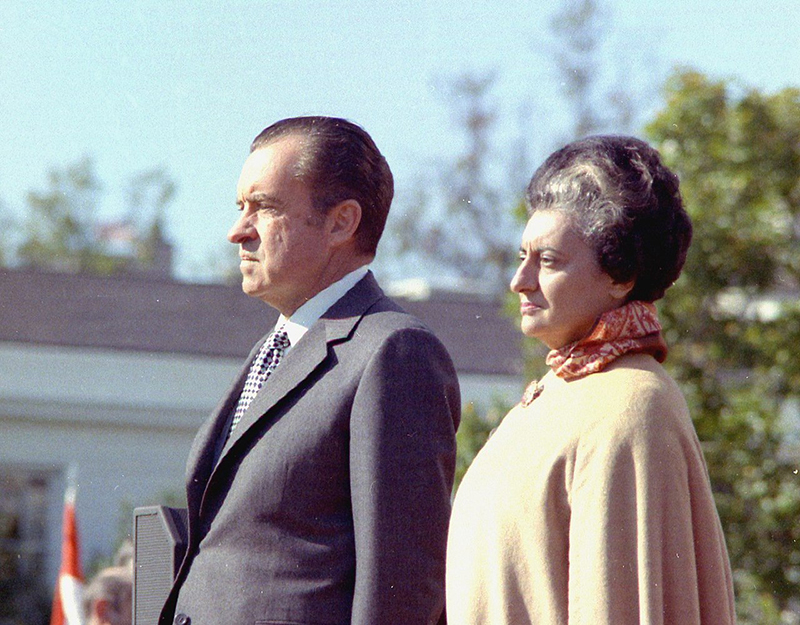 Indira Gandhi with U.S. President Richard Nixon, 1971. Photo courtesy: Wikipedia/Creative Commons
Indira Gandhi with U.S. President Richard Nixon, 1971. Photo courtesy: Wikipedia/Creative Commons
“We really slobbered over the old witch [Indira Gandhi],” Nixon reportedly told Kissinger, as quoted in a report by The Guardian.
“While she was a b*tch, we got what we wanted too,” Kissinger replied, as quoted in the report.
“She will not be able to go home and say that the United States didn’t give her a warm reception and therefore in despair she’s got to go to war.”
“The Indians are b*stards anyway,” he added. “They are the most aggressive goddamn people around,” he was quoted in the Guardian report.
However, after Narendra Modi became the Prime Minister of India in 2014, Kissinger advocated strong ties with India.
Modi also met him in the US in 2019 and tweeted an image of the interaction.
.jpeg)
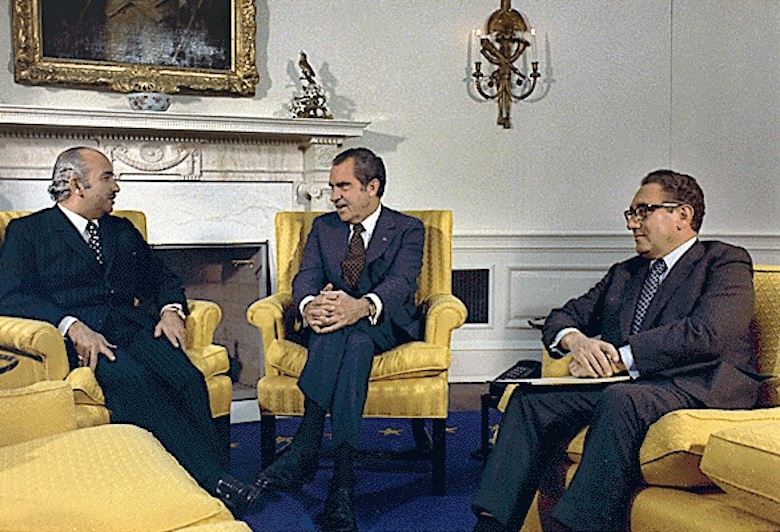 On October 31, 1973, Egyptian Foreign Minister Ismail Fahmi (left) meets with Richard Nixon (middle) and Henry Kissinger (right), about a week after the end of fighting in the Yom Kippur War. Photo courtesy: Wikipedia/Creative Commons
On October 31, 1973, Egyptian Foreign Minister Ismail Fahmi (left) meets with Richard Nixon (middle) and Henry Kissinger (right), about a week after the end of fighting in the Yom Kippur War. Photo courtesy: Wikipedia/Creative Commons
Reactions:
Former President George W. Bush remembered Kissinger for “his wisdom, his charm, and his humor.”
“I have long admired the man who fled the Nazis as a young boy from a Jewish family, then fought them in the United States Army. When he later became Secretary of State, his appointment as a former refugee said as much about his greatness as it did America’s greatness,” he said in a statement. “He worked in the Administrations of two Presidents and counseled many more. I am grateful for that service and advice, but I am most grateful for his friendship.”
Former UK Prime Minister Tony Blair described him as an artist of diplomacy. He said Kissinger was motivated by “a genuine love of the free world and the need to protect it”.
The Chinese foreign ministry spokesperson Wang Wenbin said “Dr. Kissinger was a good old friend of the Chinese people.” He said he is a pioneer and builder of Sino-U.S. relations” which the two countries should take forward following his political courage and diplomatic wisdom.
Russian president Vladimir Putin was quoted by Reuters saying that “the name of Henry Kissinger is inextricably linked with a pragmatic foreign policy line, which at one time made it possible to achieve detente in international tensions and reach the most important Soviet-American agreements that contributed to the strengthening of global security.”
“I had the opportunity to personally communicate with this deep, extraordinary man many times, and I will undoubtedly retain the fondest memory of him,” he added.
According to Israeli Prime Minister Benjamin Netaniyhu, “Dr. Kissinger’s departure marks the end of an era, one in which his formidable intellect and diplomatic prowess shaped not only the course of American foreign policy but also had a profound impact on the global stage.”
“Henry Kissinger was not just a diplomat; he was a thinker who believed in the power of ideas and the importance of intellectual capital in public life. His contributions to the field of international relations and his efforts in navigating some of the most challenging diplomatic terrains are a testament to his extraordinary capabilities,” he posted on X.

